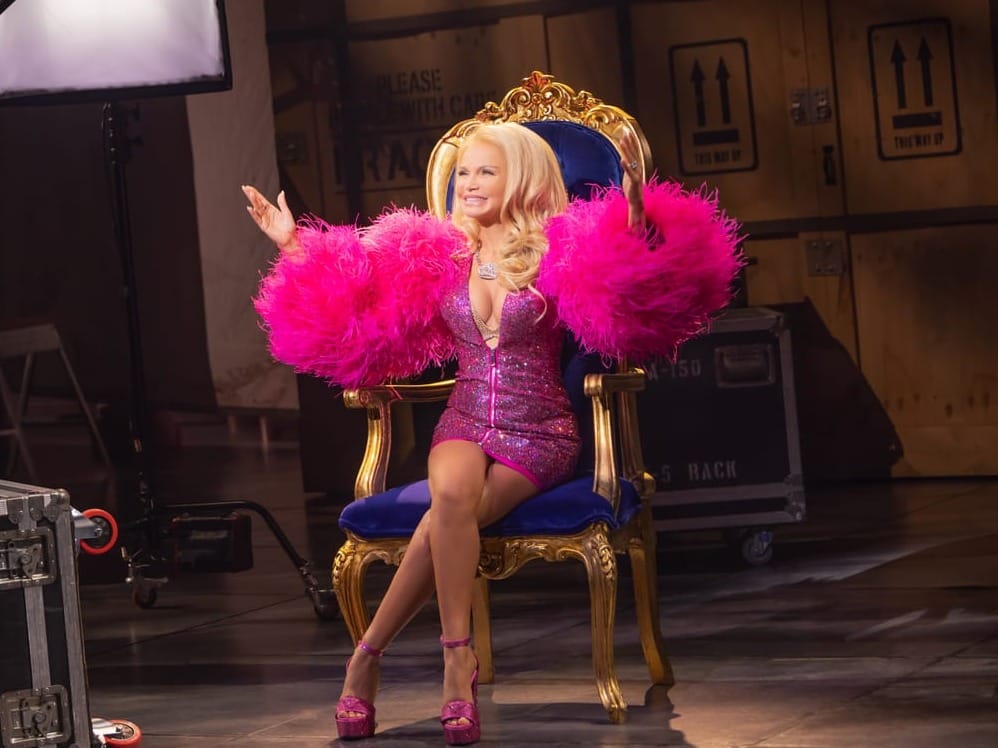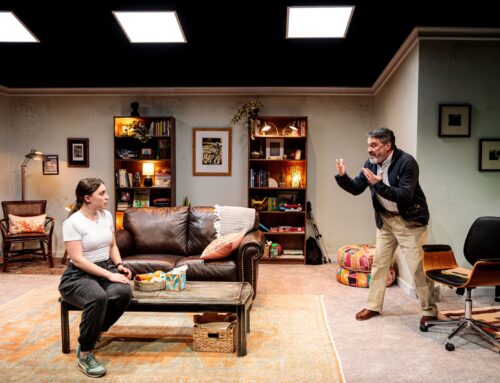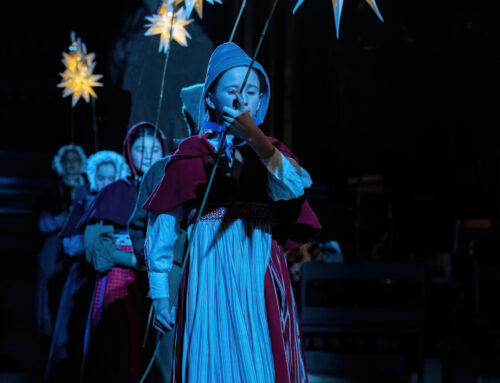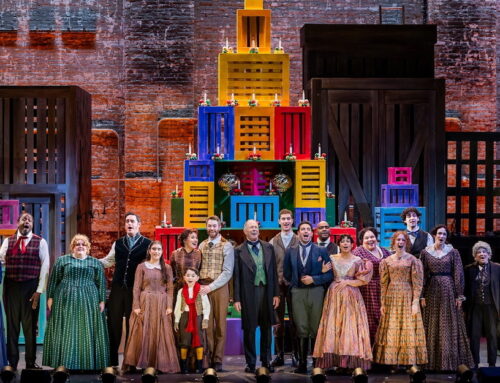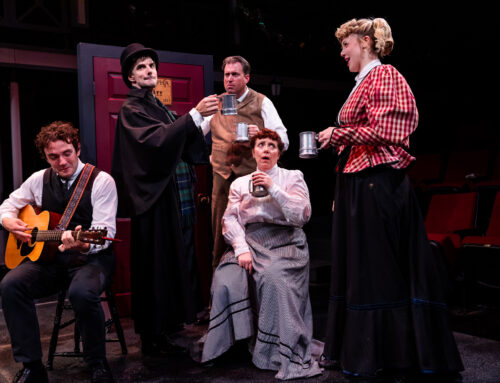THE QUEEN OF VERSAILLES is a rarity — a multidimensional musical that speaks to this moment with all of the nuances of a real life lived, and at the heart of it a thrilling, complex, masterful performance by Kristin Chenoweth. That this world premiere musical is also now debuting in our own backyard at Boston’s Emerson Colonial theater makes it a must-see before it hits Broadway!
The show is a triumph for Tony and Emmy winner Chenoweth here reunited with her Oscar/Grammy Award-winning WICKED composer/lyricist Stephen Schwartz who knows every inch of Chenoweth’s still dynamic, expressive voice and her capacity to oh-so-delicately bend it from humor to tragedy and every place in between. The show is a bit long and needs some tweaking, but what it has on its mind and the questions it raises reverberate beyond the considerable talents of its cast and first-rate production values.
The QUEEN OF VERSAILLES, smartly directed by Tony Award-winner Michael Arden, with an insightful book by Lindsey Ferrentino and based on the hit documentary, tells the deeply American tale of Jackie Siegel, a small-town girl laser-focused on fame and fortune, the accumulation of which passes for royalty in America. The “show” actually started BEFORE the show on press night with the audience glammed out in heels and sequins, strutting the aisles, taking selfies, awaiting their queen like loyal subjects. Onstage, a Versailles-like set (Dane Laffrey) a gilded drawing room with floor to ceiling gold-framed portraits, is backdrop to footmen in powdered wigs and maids fussing about dusting three glittering chandeliers. Suddenly Louis the XIV (a divinely supercilious Pablo David Laucerica) appears, and as his portrait is being painted, he sings the show’s opening lines:
“I am Louis Quatorze. My life is shinier than yours!”
And we’re off! I was in hysterics. What unfolds is one woman’s quest to have the shiniest life of all which begins with her being crowned “Mrs. Florida,” and eventually marrying the so-called “Timeshare King” David Siegel who is blind to everything except making billions and making Jackie happy. F. Murray Abraham, though he doesn’t really sing, gives it the right blend of affability and cluelessness. But they should ditch his pointless country western number astride a fake life-size horse, and instead choreograph a big number (a la the sound of music?) to at least introduce their passel of seven kids most of whom are missing in action here.
When Jackie sets foot in Versailles, Louis the XIV’s opulent country palace, her perspective– like that endless Hall of Mirrors- is scaled up to infinity and she sets out to build the largest private home in America in the place where dreams come true: ORLANDO. Plans for her 90,000 square foot manse include not only 27 or so bathrooms, but its own Benihana restaurant and a Godiva Chocolate Shop.
Blithely oblivious to the vapidity and tackiness of her outsized dreams (not to mention the emotional price she will pay down the road) we instantly fall for this flawed heroine and it’s all because of Kristin Chenoweth. Like all great actresses, she invests in the humanity of this character and makes us love her. As Jackie, prancing around the stage in her platform heels, her fluffy little pooch clutched to her cleavage, bursting with cheery determination and thrilled at her own good fortune, we can’t help but laugh at her but also cheer her on. As Chenoweth propels her tiny body and Jackie’s big persona through almost every scene – she’s irresistible. While she’s on stage, it’s hard to look anywhere else.
And there’s plenty going on. The entire musical is a commentary on these self-referential times. As in real life, Jackie has hired a documentary film crew to video every second of construction. Defying gravity and her budget, she swirls around the stage on a tall rolling ladder, triumphant amidst the scaffolding. We are behind the scenes and out front at the same time. The deliciously garish sets and video projections double down on every cheesy performative grand gesture, from corridors of fluted marble columns, a huge winding staircase, and even antique portraits repainted, substituting Jackie’s visage!
In Jackie’s world, more is more– until it isn’t. Though she spares no expense on material goods, the Siegels shortchange crucial emotional investment in family, namely their daughter Victoria played by Nina White. White cuts to the chase and brings the house down with Victoria’s poignant lament “Pretty Wins” in which she recognizes that she’s on the losing end of the beauty queen sweepstakes, widening the gulf between her and her unconscious mother. But it’s Jackie’s appallingly insensitive reaction to tragic events in the second act which makes us cringe.
This is compelling territory and the show does an excellent job of melding these wild swings in tone. The show takes a swipe at the very definition of the American dream — holding a mirror up to our conspicuous consumption and delivering brilliant number in Act II (thrillingly sung by Cossondra James) which knocks us back to the casualties of the French revolution and we are reminded of those supercilious French aristocrats with whom Jackie identifies who lost their heads to a hungry mob. I applaud Ferrentino’s book and Schwartz’s lyrics for treading here, calling our attention to the similarities and the darkness of Jackie’s reaction to them.
There is a song “Little Houses” which tenderly underscores the heart of the show, even as Jackie remains poised on the edge of the abyss of want. In an era of mega wealth and vast income disparity, when the “American dream” is out of reach for more and more people, this show is ultimately about a too large house for which all its inhabitants have paid too dearly.
The show’s final moments are extraordinary for their ambiguity. The mistress of the house has weathered the darkness, just barely. Is she perhaps redeemed by her big heart and drive, despite her tone deafness to those closest to her? In these moments, Kristin Chenoweth digs deep into Jackie’s ambivalence with all of her dramatic capabilities on full display. She lets us feel Jackie’s discomfort. And with no easy answers at her disposal, she delivers the last song, not one of triumph but of survival. Our heroine, an avatar of our time, carefully mounts that grand staircase again, trying to find her footing on the flawed foundation on which she stands.
DON’T MISS THE QUEEN OF VERSAILLES now at the Emerson Colonial Theater extended until 8/25– before it goes to Broadway!

